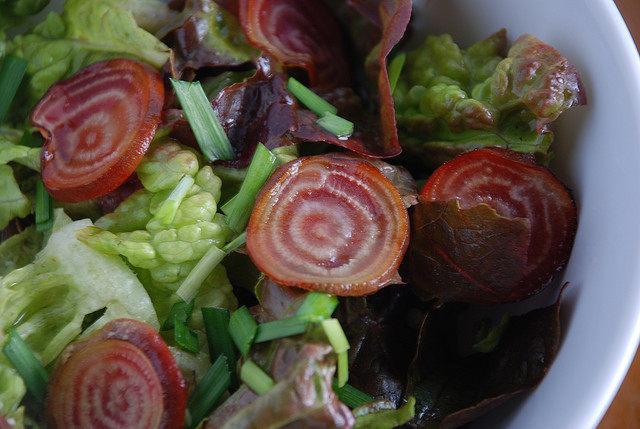(Ironically Ina Denburg, our Healthy Living correspondent, was felled by a food-borne illness in mid-July. She was out of commission for 10 days, but is now back to normal. We’ve pulled this piece out of the vault to give her some catch-up time. Watch for Ina’s next piece in two weeks.)
Organically grown, local, whole, affordable, planetary stewardship, food justice, sustainably farmed, humanely raised and slaughtered, slow cooked and seasonally eaten, nutritionism, vegan, healthy lifestyle; these are just some of the words that come to mind around the elite conversation of How, What, When and Where we eat these days. There is so much to talk about, and these words do not exist in isolation of one another.
Many of them however seem light years away from these: obesity, diabetes, sedentary lifestyle, fast food, 24/7 shopping, pre-packaged, fried, salted, supersized, processed, preserved, nutritionless, agrifarmed, food stamps, and subsidized school lunches.
 Where is the middle ground and who is standing there? The new USDA Dietary Guidelines that basically proclaims “eat less, more plant-based and whole foods” are aimed at all of us, but WHO IS LISTENING?
Where is the middle ground and who is standing there? The new USDA Dietary Guidelines that basically proclaims “eat less, more plant-based and whole foods” are aimed at all of us, but WHO IS LISTENING?
Michael Pollan’s seven famous words of wisdom – “Eat Food, Mostly Plants, Not too much” – seem so simple, and yet, why is it so radically difficult for America to comply with them? Why is it so challenging for us to remember that we are – in large part – animals, and like all animals, require MOVEMENT daily, and simple food to function well? Why is it common sense to me that FOOD isn’t and shouldn’t glow in the dark, be a list of chemicals I cannot read, squirt out of a can, come preprocessed in a box, or have a shelf life of a few years, any more than eating the tire of my car would be an option for dinner?
In a day and age of being “connected,” we are ironically a disconnected society: our heads from our bodies, our bodies from our food, our food from its source – the source being our planet.
I have lived and worked on the path of health and wellness for 30 years and questions I raised 10 and 20 years ago are still pertinent:
- Why is it such a struggle to integrate what we know intellectually (about health/diet/wellness) with the ability to live healthfully and sensibly in our body?
- How can we rectify the disconnectedness from our own bodies (and by extension our greater body – the earth), caused by our suburban sprawl and technology-infused life, including the “junk food” industry?
- How can we equip our children to navigate the unhealthy flood tides of our mass culture, when so many of us, like fish in water, are unaware of or ignore our own unhealthy lifestyles?
And finally the one that has intrigued me for decades:
- What is it that “switches on” or exists in a person that gives them the desire to live healthfully in the first place? What must remain present to continually fuel that desire?
Now, in the context of good food, I have to add these questions:
- Where do our values around food, health, exercise, life maintenance, consumerism, and planetary stewardship show up in how we actually live?
- How does financial privilege factor in?
- How do we increase and apply our awareness to keep our goals and values alive for each of us, every day?
- What are the social, economic, emotional, and logistical factors that bear down and influence our life-style, and consequently our food choices?
- What does lifestyle even mean?
All of these questions are topics I want to discuss. Beginning with my next article, I will enter the conversation from the platform of HOW, offering a strategic principle whose wisdom may be applied globally to the 3 W’s of food – what, when, and where.
Until then, I hope these questions percolate within you too, offering a brew that is rich, complex and worthy of “tasting” together. Let’s support each other as we live, cook, eat and take better care of ourselves, our loved ones, our communities and our planet.
Photo credit: kthread, used with permission under Creative Commons license.

Thanks Ina. Lots to think about…This will keep me going for a while…look forward to following the conversation and your next article.
Great post Ina and thanks for all the inspiration and useful knowledge! Ed Kashi